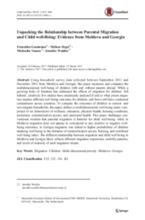Abstract
Using household survey data collected between September 2011 and December 2012 from Moldova and Georgia, this paper measures and compares the multidimensional well-being of children with and without parents abroad. While a growing body of literature has addressed the effects of migration for children ‘left behind’, relatively few studies have empirically analysed if and to what extent migration implies different well-being outcomes for children, and fewer still have conducted comparisons across countries. To compare the outcomes of children in current- and non-migrant households, this paper defines a multidimensional well-being index comprised of six dimensions of wellness: education, physical health, housing conditions, protection, communication access, and emotional health. This paper challenges conventional wisdom that parental migration is harmful for child well-being: while in Moldova migration does not appear to correspond to any positive or negative wellbeing outcomes, in Georgia migration was linked to higher probabilities of children attaining well-being in the domains of communication access, housing, and combined well-being index. The different relationship between migration and child well-being in Moldova and Georgia likely reflects different migration trajectories, mobility patterns, and levels of maturity of each migration stream.

